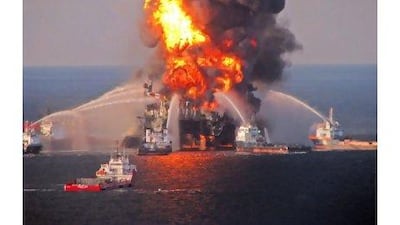It will be a happy festive season for American lawyers, that's for sure.
Legal eagles in the US have been clocking up big fees all year on the Al Gosaibi-Saad imbroglio, but these have been dwarfed by the goodies coming their way from the Bernie Madoff litigation; now US government lawyers are getting in on the act with a lawsuit against BP that could cost the company tens of billions of dollars.
At first sight, the new assault on BP looked serious, indeed. The oil company has been on the rack all year over the oil accident in the Gulf of Mexico that led to the deaths of 13 workers, a serious environmental situation, and the departure of its hapless chief executive, Tony Hayward.
The share price was savaged (though it has partly recovered) and the balance sheet hit by the provisions BP had to make to pay clean-up costs and compensation resulting from the spill. The company put US$20 billion (Dh73.46bn) in an escrow account and also provisioned $10bn for additional costs.
If you make the reasonable assumption that the original $20bn is dead money and will be used up in some form or other pretty quickly, the new action seems to break the bank for BP. The penalties from violating the Clean Water Act alone could total as much as $21bn, a figure that dominated headlines after the suit was filed.
So I was surprised to hear a pretty sanguine response from an old pal at BP in London. "You know what American lawyers are like. They'll always go for the highest possible figure as an opener, it sets the pace for the negotiations."
He explained that there was even a feeling of some relief because the US writ, issued by Eric Holder, the attorney general, did not include the dreaded term "criminal", which would have ratcheted the whole thing exponentially.
Mr Holder's writ talked about liability "without limitation", and the $21bn figure is a first stab based on the number of barrels spilled into the Gulf. BP feels it is an opening gambit to set the bar as high as possible. The final figure will be a matter of negotiation but is unlikely to be anywhere near the $21bn headline figure.
A number of other companies were also named in the writ, but notable for its absence was Halliburton, the oil services company that poured the concrete that, according to BP's own internal investigation, failed to prevent the blow-out.
Halliburton has dual headquarters in Houston and Dubai. Mr Holder has reserved the right to pull other corporations into the legal process. Maybe the Dubai legal profession will get its chance for a little slice of the action, too, at some later date.
Lawyers in Baku, Azerbaijan, will probably have no such luck. On the day that the US authorities issued their writ against BP, it emerged (via WikiLeaks) that the company had suffered an accident in the Caspian Sea in 2008.
Quite why the comparisons were made between the situation on a rig in the Azeri-Chirag-Guneshli (ACG) field and the Deepwater accident, I cannot understand.
No oil escaped in the Caspian from the incident; there was only a build-up of gas. The rigs on the field operate at a much shallower depth than in the Gulf of Mexico. There was the potential for a blow-out, but only limited risk of the kind of environmental damage caused by Deepwater.
There were no fatalities in the Caspian, against the 13 deaths associated with Deepwater. The Caspian rig was evacuated safely, and there was no explosion. The main casualties seem to have been BP itself and the Azerbaijan balance of payments: the rig was closed down immediately and production suspended.
Why the matter was worthy of the WikiLeaks treatment is also a mystery. The accident and the evacuation were reported at the time by international newswires, and reference was made to it in last year's annual report.
But the renewal of interest will not be welcome to BP. The operation in Azerbaijan is important. The ACG field is one of the largest in the Caspian, which oil experts regard as one of the world's comparatively under-exploited regions.
BP also operates the controversial Baku-Tiblisi-Ceyhan pipeline that bypasses Russia to take oil to Europe. BP's investment in the country is considerable.
The region's importance can be measured by the fact that BP executives who serve in Baku usually go on to greater things in the company.
Bill Schrader was the president of BP Azerbaijan when the ACG incident took place. Mr Schrader has since gone on to be head of BP's problematic but hugely significant joint venture in Russia, TNK-BP.
Also in Azerbaijan about the same time was Charles Proctor, who has since moved on to be head of BP in the Middle East, based in Abu Dhabi. He will no doubt be hoping for fewer leaks - both of the gas and Wiki varieties - while in the UAE.

